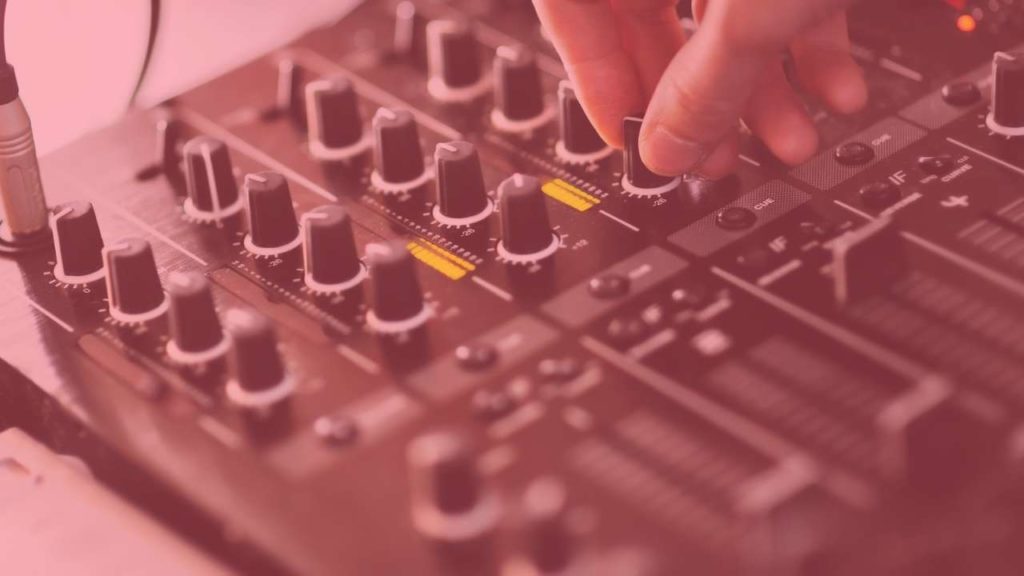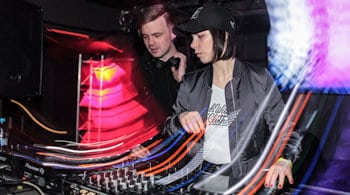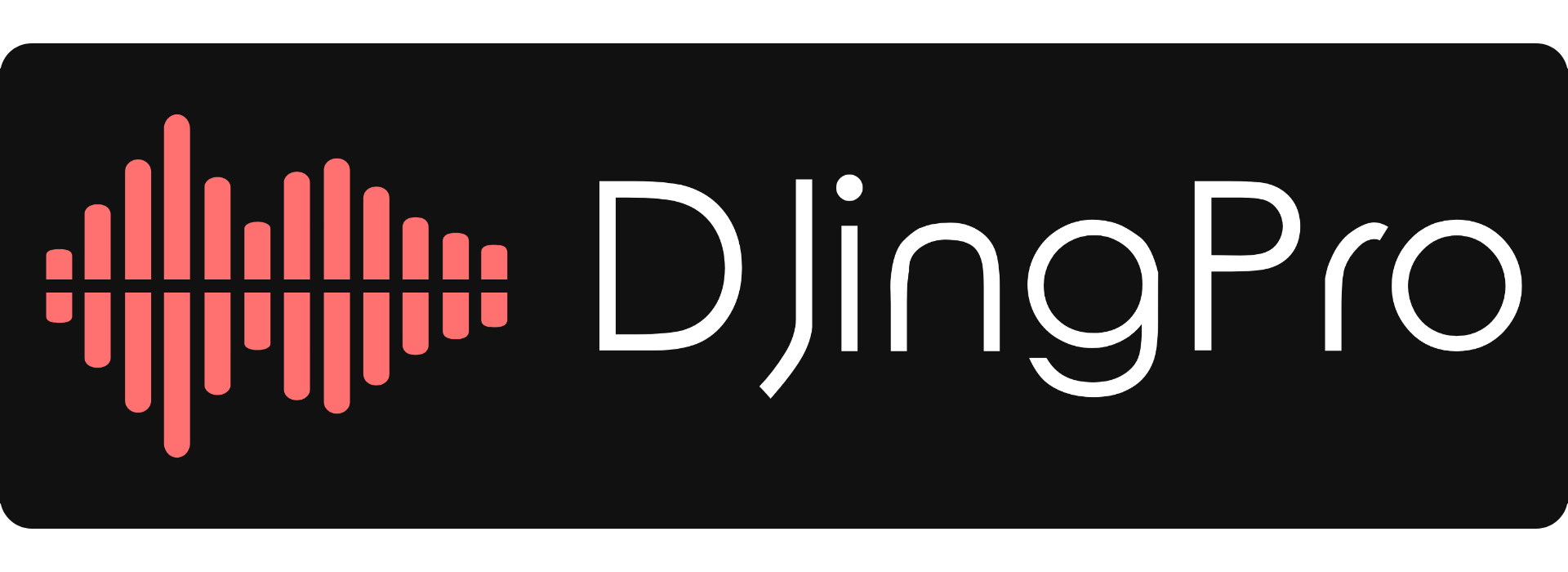DJing is a big learning process and if you’re ready to start you may feel a little overwhelmed by it all. Lots of people rush into it and get it all wrong, I even made some mistakes myself in the beginning. I’ve seen lots of people fail, so I’ve put together these DJ tips for beginners to guide you in the best possible direction for success.

Top 11 DJ Tips for Beginners
1. Choose the right DJ equipment
Choosing your first DJ setup is super exiting but it’s easy to rush into it and buy the wrong gear. You could end up with poor equipment, something that doesn’t suit your style of mixing, or something you’ll quickly outgrow.
First in the line up of DJ tips for beginners is to think about what type of DJing you want to do. Do you want to become a club DJ, mobile DJ, scratch DJ, or house party DJ? Or are you doing it as a hobby, and just for a bit of fun at home? You’re choice will determine the type of equipment you will need…
Clubs DJs
Most clubs use stand alone players and a mixer, some will have controllers, but you usually have to take your own laptop. The industry standard club kit will consist of 2 Pioneer CDJ 2000-NXS2 players, and a Pioneer DJM-900NXS2 mixer.
If you would like to DJ in a club I’d recommend buying CDJ’s or multi players that allow playback from USB devices. Club standard gear is expensive, but if you can afford it buy it, if not it’s not necessary. But it will be necessary to familiarise yourself with the club standard equipment before your first gigs.
Mobile DJs
The most convenient option for mobile DJ’s will be DJ controllers. These have a mixer with two decks built into one unit which controls playback from digital music files on a laptop.
If you’d rather not carry a laptop your other option is an all-in-one unit. These playback music from USB devices, so all you’d need to carry is a thumb drive. These two options make transporting kit for mobile DJ’s much easier.
House Party DJs
If you’re plan is to throw house, pool, birthday parties, etc, your options will be similar to mobile DJ’s. You probably won’t be travelling around with as much equipment as a mobile DJ, so you may consider separate players. Multi players that allow playback from USB thumb drives with a 2 channel mixer will work great.
Scratch DJs
If you’re goal is to become a scratch DJ then you have a few options:
- If you’re planning on club mixing with a bit of scratching you’ll want a set of players with good solid jog wheels. The jogs will be doing a lot of work so this is important. You’ll also need a good mixer with an adjustable crossfader to easily switch from mixing to scratching.
- If you’re after a cheaper option a controller like the Pioneer DDJ-1000 is a great choice. These controllers are built with bigger jog wheels, fully adjustable faders, and you can easily switch from mixing to scratching for the best of both worlds. I own a DDJ-1000 and my full review is HERE.
- If your goal is turntablism you’ll want a set of turntables with a digital vinyl system. You can read all about digital vinyl systems HERE. You’ll also want a good solid mixer with adjustable faders.
Bedroom DJs
If you’re in it for a bit of fun then the choice is yours. A controller offers great value for money and saves on space. But some DJ’s find stand alone players more fun.
Turntables are another great fun choice, but vinyl prices are ridiculous… But that’s not an issue with a digital vinyl system that lets you play tracks from your computer! Read all about digital vinyl systems HERE.
Now you know what type of DJing you want to pursue you can choose your setup. To discover the 6 best setups with picture examples of each check out > THIS ARTICLE
Laptops
If you choose equipment that requires a connection to a laptop you will have to make good choices. I’ve purchased top of the range laptops that are just hopeless for DJing. Even laptops that meet the manufacturers specified system requirements can be laggy.
A Macbook is by far the best choice for DJ’s and is the only brand that I’ve found suitable. But if you can’t afford one you may end up returning many laptops before you find one that works well with your software.
2. Learn every function on your equipment
You’re probably thinking, “what, why wouldn’t I learn all about my equipment?” But there’s actually many functions on DJ controllers that some DJ’s ignore, like a button’s secondary function for example. Some DJ’s ignore the shift button simply because they don’t know what it does! Learn all about the shift button HERE.
You can also learn how to use DJ mixers HERE, and how to use a DJ controller/players HERE.
Another function often ignored is the slip mode feature found on many Pioneer players and controllers. This keeps your track playing at the same rhythm in the background whilst looping, scratching, and using hot cues, etc. I’ve found this feature really awesome and often use it whilst scratching vocals mid in the mix. The tracks stay perfectly beatmatched as if you’d never touched the jog wheel.
Some of these features may be a little advanced for beginners, but you’ll soon progress. If you know they’re there you’ll soon be using them to make your sets stand out above the rest.
3. Beatmatching
Learning how to mix will take many hours of practice. This can be made easier by using modern equipment with auto sync and quantize options.
Auto sync matches the speed of the track you’re ready to mix in with the one that’s already playing. This feature is awesome, but what if you ever need to use club equipment that doesn’t have it?
That’s why number three in DJ tips for beginners is don’t rely on SYNC, always learn beatmatching by ear. I shouldn’t really have to include beatmatching in a DJ tips for beginners article, it should be something every DJ learns. Beatmatching is an important skill for every DJ to possess, but it’s a skill that I’m seeing used less and less.
Most clubs have some old back-up turntables or CDJ-1000’s kicking around, and one day their modern equipment may break down. If this back-up equipment is needed and their DJ’s know how to beatmatch the party can continue. If you can’t beatmatch the night could be ruined and you could look pretty lame. But we all know you can do it, so fire up the decks and learn how to beatmatch now!
You can learn all about beatmatching by ear in my MIXING ARTICLE. The article will also teach you everything else you need to know about mixing tracks with lots of DJ tips and tricks.
4. Create good habits
This is definitely one of the most important DJ tips for beginners. Whilst learning the basics of DJing some DJ’s can get into bad habits that stay with them forever.
An example of this that I see every time I play at a club is DJ’s ignoring the EQ’s. Many of my friends also do this, and they just can’t break the habit as they’ve been doing it for so long.
Using the EQ is super important and will make your mixes sound 50 times better when you master it. Check out my full article on EQ mixing with lots of DJ EQ tips HERE.
Another example I see all the time is DJ’s ignoring the VU meters on their mixers. Even experienced DJ’s are guilty and you can watch many famous DJ’s making this mistake on videos available online. This can lead to equipment damage, and I recently witnessed a DJ cause a speaker blowout because of this mistake. This is also covered in the EQ article linked above.
5. Stick to one genre of music
Learning how to beatmatch by ear can take a long time. Something that prolongs the learning process is switching between genres and BPM’s. It’s important for DJ’s to play a wide variety of music, but wait until you can beatmatch perfectly.
When you do decide that it’s time to start playing multiple genres, you’ll find that the technique is slightly different for each one. I’d recommend that you choose a genre with punchy snares whilst learning. These tracks are easier to beatmatch as you can distinguish between the two tracks easier.
6. Count the beats
When you’ve got the basics of beatmatching figured out, you’ll also need to get the tracks lined up by counting beats. This is done by dropping the first beat of the second track in time with the first beat of the track that’s currently playing. It’s important to get this right or your mixes will sound awful, get it right and they’ll flow seamlessly.
There’s a full explanation of how to do this correctly in my MIXING article.
7. Record your mixes
You may not be ready to start making mixtapes just yet, but you should still record your mixes! You can then listen back and decide where exactly you need to improve your mixing. Even if you think the mix is perfect when you drop it, it will sound completely different listening back. This is something I did a lot as a beginner and it’s one of my top DJ tips for beginners, it helped me loads!
When you listen back to your mixes you will also be getting a taste of what your audience will be hearing. Keep recording and listening back until you feel happy enough to start handing out your mixes. You could also upload them for the world to hear, this will bring you great constructive criticism.
8. Don’t confine yourself to the bedroom

It’s easy to hide away in your bedroom for days at a time working on a mix. But as you start learning more about becoming a DJ, it’s time to start playing gigs.
You can play at home by yourself for a while but you’ll learn far more from your first gig than you will in hours of playing at home.
My rule of thumb is, once you have the basics down, start playing for friends. Then start playing at house parties and see if you can get a club gig near you.
At the very least, start playing with or for your friends though. They won’t judge you and you should get some valuable feedback on your new mixes!
9. Avoid cheap headphones
Don’t buy cheap headphones unless it’s absolutely 100% necessary. I know it’s hard when you’re starting out, equipment prices can really break the bank. But cheap DJ headphones will not last long, no matter what the manufacturer tells you. Headbands quickly wear out, cheap materials crack, ear cup padding splits, cables break, and the sound quality sucks!
Even if you have to save up a few weeks longer it’s really worth waiting it out. At the end of the day you will actually save money as you won’t have to keep replacing your headphones.
This is a mistake I made in the beginning, I went through lots until I realised cheap means poor quality. Read reviews before buying and check out my popular article HERE. The article includes a guide on finding the best DJ headphones and what to look for, along with the top choices available.
Next in DJ tips for beginners is a couple of tips for the aspiring club DJ’s…
When you feel confident in your mixing abilities getting out and playing parties or venues should be a priority. This may actually be your current goal but many DJ’s never feel confident enough to move on. Many DJ’s think their mixing could be better, but in actual fact they’re more than ready for their first DJ gig.
If you get stuck in the ‘I’m not good enough’ trap, you may never leave the bedroom. Try organising a party for your friends to get a feel for playing to an audience, this is great practice. If that goes well you can contact a few bars, clubs, etc.
You may feel super nervous about your first DJ gig, many DJ’s get really anxious every time they play. So don’t think you’re alone, this is completely normal, I’ve felt it lots! But as soon as you drop that first mix the nerves will go away, and you’ll start to enjoy yourself.
Next up in DJ tips for beginners is a way to save yourself lots of money over the coming months!…
10. Film your DJ sets
When learning to DJ it may feel hard to dance and jump around like you see your favourite DJ’s doing. So this DJ tip is best learned after mastering the basics of beatmatching and mixing.
This tip only applies to anybody that would like to play at any type of live venue with a crowd. I’ve included it in DJ tips for beginners as it doesn’t take long to progress to being a club ready DJ.
A good way to find out what your audience will see is to film yourself DJing at home. Before looking for your first gig it’s important that you get this right. Club owners and promoters will notice your energy and confidence and they’ll want you to return to play there again.
You should always try to give off a good positive energy, nobody likes a boring DJ that looks uninterested. This drives people off the dancefloor and gives the venue a bad reputation. You’ll also hurt your own reputation and you could end up with a bad name for yourself and no gigs.
When you’re filming you should try to imagine yourself in front of a large crowd, and play exactly as you would at the gig. You could also use DJ tip number 7 and record the audio at the same time. When you can nail both simultaneously you’ll know you’re ready!
To find out more about playing at clubs and venues check out – THIS ARTICLE.
11. Imitate the club environment
This is another DJ tip for beginners wanting to progress to clubs and venues.
When you first play at a club, the environment will be a massive change to what you’re used to. It will be louder, darker, and you’ll have many distractions. Try to imitate this environment at home before looking for your first DJ gigs.
Crank the volume up, turn the lights off, and wear dedicated DJ ear plugs. Wearing ear plugs whilst DJing at loud venues is essential, you don’t want to damage your hearing. So practice some of your DJ sets whilst wearing them as mixing may seem harder to begin with.
There’s a more thorough look at DJing in different environments in this article > CLICK HERE.
Rounding up DJ tips for beginners
The DJ tips in this article will kick start your DJing journey and help you to progress to club level. But these are just the foundations and there’s lots more to learn after you nail the basics.
Check out some of these posts for more great tips to help you become a better DJ
The definitive guide to DJing > HERE
Learn how to read a crowd and become a sought after DJ > HERE
Find out the top mistakes that DJ’s make and how to avoid them > HERE
And for more advanced DJ tips CLICK HERE

Oh my word. Thank you so much for this information, I want to get into doing, I never imagined there is so much involved, I’m going to read the whole site to help me make more informed choices
What a way to give back.
Thanks again annie